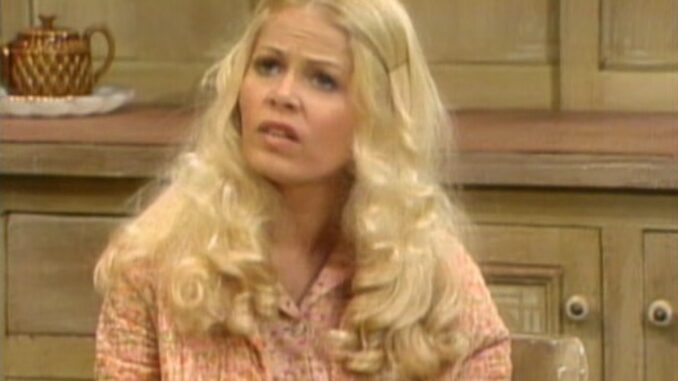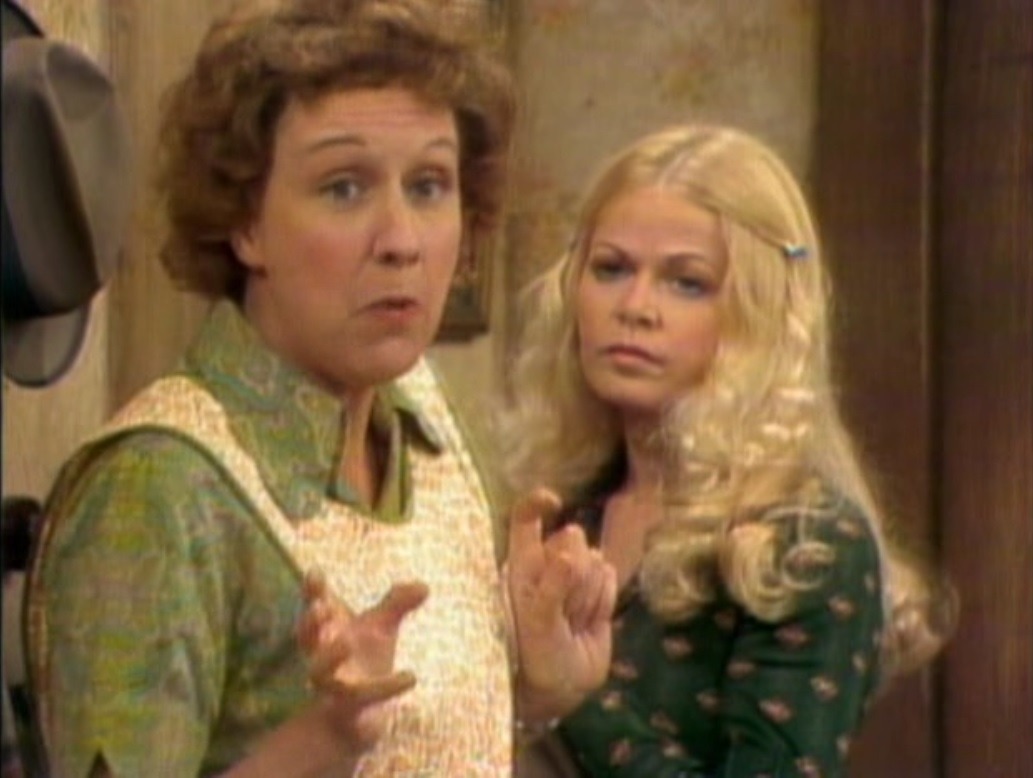
 The “All in the Family” episode “Archie’s Brief Encounter” initially aired as a one-hour special, as it dealt with some pretty heavy subject matter. Notably, it was the episode wherein it looked like Edith Bunker (Jean Stapleton) was going to leave her husband Archie (Carroll O’Connor) once and for all. Archie loves Edith, of course, but he has a selfish streak a mile wide, along with many, many other character flaws that require a lot of patience to withstand (although O’Connor himself was a stalwart union man). After its first airing, “Brief Encounter” was presented in two parts.
The “All in the Family” episode “Archie’s Brief Encounter” initially aired as a one-hour special, as it dealt with some pretty heavy subject matter. Notably, it was the episode wherein it looked like Edith Bunker (Jean Stapleton) was going to leave her husband Archie (Carroll O’Connor) once and for all. Archie loves Edith, of course, but he has a selfish streak a mile wide, along with many, many other character flaws that require a lot of patience to withstand (although O’Connor himself was a stalwart union man). After its first airing, “Brief Encounter” was presented in two parts.
In the episode, Archie is feeling neglected by Edith, as she is putting in a lot of hours at Sunshine Home, the retirement home where she works. Then, one evening, Archie receives romantic attention from a waitress named Denise (Janis Paige). When Edith catches Archie flirting with Denise, she is incensed and heartbroken. Other details about Archie’s whereabouts eventually lead her to believe that he is having an affair. In one heart-wrenching scene, Edith, unable to speak a word, packs her bag and goes to live at Sunshine Home; it’s all become too much to bear. The episode continues apace, with their peers working overtime to save the Bunkers’ marriage. For a moment, though, it did seem that everything was falling apart.
Stapleton, it seems, was the one who conceived of that scene. In a 1981 interview with the San Francisco Examiner, the actor revealed that the original script for “Archie’s Brief Encounter” contained a long, angry, very wordy screed wherein Edith scolded Archie and poured her heart out. Stapleton, who had been playing Edith for six seasons on “All in the Family” by that point, argued that an angry rant was very out of character.
Stapleton felt that Edith wouldn’t yell at Archie
Stapleton noted that “All in the Family” creator Norman Lear was always very open to story and character suggestions from his cast, so she had no issues bringing up Edith’s out-of-character moment to him. When it came to catching Archie with another woman (potentially), Stapleton said that Edith wouldn’t have reacted the way she was initially written. As she put it:
“They have a confrontation at home. [Edith] has found out that he went to [the waitress’] apartment. He tries to lie his way out of it. […] She wouldn’t have been able to cope, or release a great flood of words. […] [So, instead, Edith] went to the closet, got her coat on, and very solidly left.”
Edith was often depicted as something of a naif, but she was emotionally honest and definitely had her breaking point. Archie, meanwhile, was such a popular character that he became a new TV archetype: the lovable misanthrope. Poor Edith was constantly stifled by him (with Archie often demanding that she stifle herself). “All in the Family” lasted nine seasons (!), so of course Archie had to soften at some point. Edith remained patient through the whole series, though, and Archie would lose his rudder altogether when Edith died, as revealed in the spinoff series “Archie Bunker’s Place.”
Edith was so good-natured that when she was mad, you knew things were bad. When she wrestled with serious personal issues like faith (as she did in the episode “Edith’s Crisis of Faith”), she was really wrestling. Stapleton’s silent outrage at Archie’s potential infidelity was enough. Stapleton knew what she was doing.
When you think of All In The Family, what’s the first image that pops into your head? Most fans immediately recall Edith Bunker — the sweet, loving, and sometimes overly patient wife of Archie Bunker. But did you know that Jean Stapleton, the actress behind this beloved character, once put her foot down and forced the show’s creators to change a key scene? Let’s dive into the real story behind this moment and why it mattered so much — not just to Stapleton, but to the show’s legacy.
The Woman Behind Edith Bunker: Who Was Jean Stapleton?
Before we get into the drama of the scene, let’s give credit where it’s due.
Jean Stapleton wasn’t just another sitcom actress — she was a theater-trained performer with serious acting chops. She understood Edith Bunker more than anyone else, and she knew what the character represented to millions of viewers.
Why Edith Bunker Was More Than A “Dingbat”
Sure, Archie called Edith his “dingbat” — but fans knew better.
Edith was the heart of the show, the moral compass, and sometimes even the voice of quiet rebellion. Stapleton wanted to make sure Edith remained authentic and respectful to real women watching at home.
The Controversial Scene That Sparked A Showdown
So what was this scene that made Jean Stapleton dig in her heels?
The writers had originally planned a storyline where Edith was supposed to tolerate sexual assault in a way that Jean felt was completely out of character. In a two-part episode titled “Edith’s 50th Birthday”, the script called for Edith to be attacked by a man — and shockingly, for her to respond in a way that was too soft, too forgiving.
Why Jean Said ‘No’ To The Original Script
Jean Stapleton simply wouldn’t allow it.
She argued passionately with the producers: Edith would never, ever respond passively to such an attack. Edith was kind — not stupid. Stapleton feared the audience, especially women, would get the wrong message if Edith simply shrugged off something as horrifying as sexual assault.
Norman Lear’s Dilemma: Creator vs. Star
Norman Lear, the genius behind All In The Family, found himself in a rare bind.
He trusted Stapleton — but he also knew this was groundbreaking territory for a sitcom. Could a comedy show in the ’70s handle a storyline about attempted rape? Could they do it responsibly? Thanks to Stapleton’s insistence, the script was reworked.
How The Scene Changed Forever (And For The Better)
Instead of having Edith silently endure the assault, the final scene showed her fiercely fighting back and escaping.
It was shocking. It was uncomfortable. And it was real.
This change transformed what could have been a problematic scene into a moment of empowerment. Audiences were stunned — but also inspired.
Audience Reactions: Shock, Praise, And A New Respect For Edith
When the episode aired, viewers were glued to their screens.
Some couldn’t believe such a serious issue was playing out in their favorite sitcom. But many praised Stapleton for her integrity — and for protecting Edith’s dignity. Letters poured in thanking the show for handling the issue with unexpected sensitivity.
Edith Bunker As A Feminist Icon?
It’s wild to think — but this one episode made some people view Edith differently.
She wasn’t just the housewife who baked and fussed over Archie. She was a woman who fought for herself when it mattered most. Jean Stapleton’s quiet protest turned Edith into an accidental feminist hero.
The Legacy Of ‘Edith’s 50th Birthday’
To this day, that two-part episode is remembered as one of All In The Family‘s most daring moments.
Critics and fans alike point to it as proof that sitcoms could tackle serious, real-world issues without losing their heart or humor.
Jean Stapleton’s Courage: An Actor’s Power Over The Script
It’s rare for an actor to tell writers and producers: “No — this isn’t right.”
But Stapleton knew her character inside out. She understood how powerful this moment could be — or how damaging, if handled poorly. And she refused to let Edith’s integrity be sacrificed for shock value.
The Ripple Effect On Future TV Shows
This moment did more than change one scene.
It proved that actresses could stand up for how women were portrayed on TV. Shows like The Golden Girls, Murphy Brown, and even modern dramas owe a debt to Jean Stapleton’s quiet rebellion.
What If Jean Had Stayed Silent?
Let’s play the “what if” game for a minute.
What if Stapleton had said nothing? What if Edith Bunker had been portrayed as weak, passive, or forgiving in the face of violence?
It could’ve sent a terrible message to millions of women watching. Instead, because of one actress’s courage, the story changed — and TV changed with it.
Norman Lear’s Response: Respecting Stapleton’s Vision
To his credit, Norman Lear didn’t pull rank.
He listened. He agreed. And he let Stapleton guide the character’s reaction. This rare moment of collaboration between star and creator resulted in one of TV’s most powerful, unforgettable episodes.
Fans Still Talk About This Episode Today
Even decades later, fans and critics mention Edith’s 50th Birthday when discussing TV’s bravest moments.
It holds up — and it’s because Jean Stapleton wouldn’t let Edith Bunker become a victim in the script.
The Real Lesson Behind This Story
What’s the takeaway?
It’s simple: sometimes the actor knows best. Jean Stapleton wasn’t just playing Edith — she was protecting her. And in doing so, she protected the millions of viewers who saw a piece of themselves in Edith Bunker.
Conclusion: Jean Stapleton Changed More Than A Scene — She Changed Television
Jean Stapleton’s decision to speak up changed more than just one episode of All In The Family.
It reminded Hollywood — and the world — that how women are portrayed on TV matters. Her quiet strength helped turn Edith Bunker from a sitcom sidekick into a symbol of real-life resilience.
Next time you rewatch All In The Family, remember: Edith’s courage wasn’t just written into the script. It came straight from the heart of Jean Stapleton herself.
